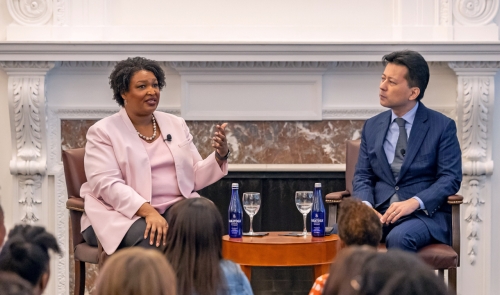At a Meltzer Center forum, Stacey Abrams argues for diversity, equity, and inclusion

Political organizer Stacey Abrams argued that companies have much to lose by abandoning diversity, equity, and inclusion (DEI) programs during her remarks at a July 11 forum hosted by NYU Law’s Meltzer Center for Diversity, Inclusion, and Belonging. Centered around the theme, “The Future of Equal Opportunity at Work,” the event brought together some 200 leaders from a variety of fields, including academia, business, law and government.
Abrams, a former Georgia state representative and gubernatorial candidate, is the founder of American Pride Rises Network, which houses several organizations focused on defending and expanding DEI. In a one-hour discussion that was moderated by Kenji Yoshino, Chief Justice Earl Warren Professor of Constitutional Law and the faculty director of the Meltzer Center, Abrams assessed the current state of DEI in the workplace. After the Trump administration issued a series of executive orders seeking to end assorted DEI initiatives in the public and private sector earlier this year, a number of corporate giants—such as Meta, Walmart, McDonald’s and Amazon—announced plans to either significantly scale down diversity and inclusion programs or to eliminate them entirely.
Citing grassroots-led nationwide boycotts against Target following its publicized rollback of DEI, Abrams argued that companies risk alienating a sizable portion of their consumer base by abandoning their commitment to diversity-related initiatives. “It may not cost you in the short term, but in the long term,” she said. “I’m also less sympathetic to multi-billion dollar corporations that are concerned about losing a few contracts when they’re willing to sacrifice whole communities for that purpose.”
While conceding that businesses face immense political pressure over DEI, Abrams countered that the corporate retreat from such programs has been revealing. “If your mission was true equality, if your mission was true equal opportunity, then it wouldn’t have taken the murders [of George Floyd and Ahmaud Arbery in 2020] and the zeitgeist to create that space,” she said. “But for those for whom it was a moment to performatively say, ‘Here’s who we are,’ it was very easy then to rescind because it was never who you were. It was something you thought you had to do.”
Abrams applauded retailer Costco, whose shareholders voted overwhelmingly in January against implementing an anti-DEI proposal. The company’s board of directors had voted unanimously not to recommend the proposal to shareholders. “Costco has always been grounded in responsibility,” Abrams said. “Therefore, irrespective of the change [in the White House], they never had to change their policies. They never had to promote who they were. They simply are. And we can see the distinction between Costco and other institutions.”
Despite major political headwinds, Abrams said, support for DEI—particularly among working-class voters—could increase if public awareness about its historical and legal impact is broadened. Popular laws such as the Americans with Disabilities Act and the Family and Medical Leave Act are DEI initiatives, she noted. “DEI is everywhere, and we spend so much time talking about the theory, but you don’t talk about the practice,” she said.
Following Abrams’ remarks, a panel featuring Yoshino; David Glasgow, executive director of the Meltzer Center; and Christina Joseph, a project director and research scholar at the Meltzer Center, discussed navigating the current political and legal landscape of DEI. The forum concluded with a third segment, “The Future of DEI,” in which Yoshino and Glasgow previewed their forthcoming book, How Equality Wins: A New Vision for an Inclusive America.



